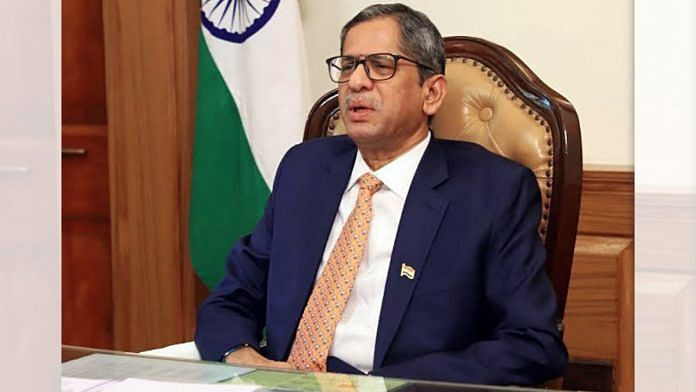New Delhi: Chief Justice of India NV Ramana on Monday defended the collegium system of appointing judges, asserting that the selection process “could not be more democratic than this”.
The CJI was speaking at the ‘2nd Comparative Constitutional Law Conversation Series’ webinar organised by the Society for Democratic Rights, New Delhi and the Georgetown University Law Centre, Washington DC. The webinar was on the topic ‘Comparative Approaches of Supreme Courts of World’s Largest Democracies’.
The event was moderated by William M. Treanor, Dean & Executive Vice President at the Georgetown University Law Center.
Addressing a question on the appointment of judges, CJI Ramana said, “Indian independent judiciary is non negotiable. The courts uphold fundamental rights and rule of law. People will trust the judiciary only if it acts independently. The judicial appointments are aimed at sustaining people’s faith and trust.”
He said the impression in India that “judges appoint judges” was “wrong”. “The appointment is done through a lengthy consultative process. Many stakeholders are consulted. The executive is one of the key stakeholders,” Ramana said.
Taking the audience through the entire process of appointment, the chief justice added: “It is true that sometimes the government can raise objections about a particular appointment. If they send it back to the collegium, we will look into the material placed before us… if we are satisfied, we reconsider or we reiterate. Once we reiterate, the government has no option, they have to appoint.”
“It’s a long-run process and consultation takes place at every stage. I don’t think a selection process can be more democratic than this,” he added.
‘Politics not relevant once you take oath as judge’
Also present at the event was Justice Stephen Breyer from the United States Supreme Court. In January this year, Justice Breyer announced his plans to voluntarily retire from the Supreme Court at the conclusion of its current term following 27 years on the bench.
Under the United States Constitution, Supreme Court judges have a lifetime tenure. They serve till their death, retirement or conviction by the Senate. The US Senate has confirmed Justice Ketanji Brown Jackson to become the first Black woman justice. She will start hearing arguments once the next term begins in October.
In India, Supreme Court judges have a retirement age of 65 years.
Justice Breyer spoke of the system of appointment of judges in the US Supreme Court, and said, “We have a system where people have a voice in selecting a judge through a Presidential appointment and a confirmation process. That’s going to be political but the job of judging is not political.”
CJI Ramana concurred with his statement, saying, “I loved the statement of Justice Breyer — the job of the judge is not political. I love this statement. Once you take an oath under the Constitution and start working as a judge, politics is no longer relevant. It is the Constitution that guides us.”
‘65 years too early to retire’
The CJI also said that sixty five was “too early” an age to retire.
Addressing a question on term limits of judges, CJI Ramana said, “I think 65 years is too early an age for someone to retire. I worked for almost 22 years as a high court judge, chief justice of the high court, Supreme Court judge, and as the chief justice of the Supreme Court. We know our date of retirement at the time of joining. There are no exceptions.”
On his future plans, he said, “I am still left with a decent amount of energy. I am the son of an agriculturalist. I am still left with some land to cultivate. I am basically a man of the people. I love to be among people. It has been my nature since my student days. I hope I will find the right avenue to invest my energy for the sake of people.”
He, however, added that “retirement from the judiciary does not mean retirement from public life”.
The CJI also spoke of the importance of diversity on the bench, saying, “Diversity in the bench promotes diversity of opinion. Diversity enhances efficiency. People from different backgrounds enrich the bench with their diverse experiences. A judge from a rural background understands the issues of rural India better. A judge from a particular region understands the issues there better. A judge from a marginalised section understands the issues of marginalized sections better.”
Also read: Why SC expressed concern over UP court’s tareekh pe tareekh in 30-yr-old arbitration award plea



